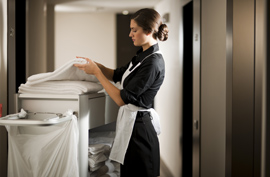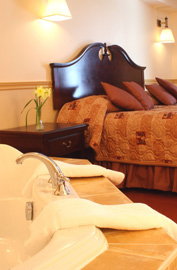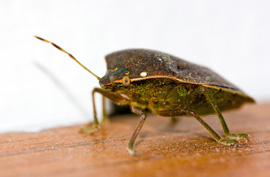 Your hotel room is your home away from home, with a few exceptions -- hundreds of strangers from every corner of the world have slept there, and the hotel staff may not have the same standards of cleanliness that you do at home. It's nice to have someone fold up your towels and make your bed while you're out exploring the world, but in terms of sanitization, a neatly made bed does not equal a germ-free room.
Your hotel room is your home away from home, with a few exceptions -- hundreds of strangers from every corner of the world have slept there, and the hotel staff may not have the same standards of cleanliness that you do at home. It's nice to have someone fold up your towels and make your bed while you're out exploring the world, but in terms of sanitization, a neatly made bed does not equal a germ-free room.
Studies have shown that germs frequently lurk in places like light switches, television remotes and telephone keypads, even in hotel rooms that otherwise appear clean -- disturbing evidence of what might be waiting when you wheel your suitcase into a suite.
Are you prepared for a dirty bedspread, a scummy toilet or even a bed bug infestation? It's highly unlikely that a slightly soiled bathroom floor will put your life in danger, yet an unclean hotel room could affect your health; the most common afflictions are colds or stomach viruses. Try the following tips and sleep more soundly on your next adventure.
Put your black light away. We've all seen footage of people scanning dark rooms with the revealing black light; stains and smears, invisible in the daylight, pop up in the most unexpected and shocking places (not the pillowcase -- anything but the pillowcase!). But traveling with this device, which is a great for dramatic effect on television, is far from necessary. Here are a few other, less obsessive things you can do to rest assured you have a clean hotel room:
Read the Reviews
There are no international standards for hotel cleanliness. Price, location or a brand name will not guarantee completely sanitary digs. So until some international "clean commission" starts sending out fastidious officials to size up squalid toilets in hotels around the world, your best bet is to find out what your fellow travelers are saying. Most travel and hotel review sites have cleanliness as a category for evaluation. Our favorite is TripAdvisor, which offers user ratings of thousands of hotels, restaurants and businesses around the world; you can also find hotel reviews on major booking engines such as Booking.com, Hotels.com and Expedia.
Wash Your Hands
In the interest of not sounding like your mother, I would like to preface this by saying that it doesn't bother me if you chew with your mouth open or your shirt's not tucked in. Hand washing, on the other hand, is near and dear to my heart. Frequent hand washing has been proven to reduce the transfer of colds and viruses, and will prevent bacteria getting from whatever it is you're touching (why is this remote control sticky?) to your mouth, eyes or nose. So even if your hotel room is poorly sanitized, some good ol' hand washing will keep the icky germs at bay.
 Watch Out for These Hidden Hotel Fees
Watch Out for These Hidden Hotel Fees
Fling Off the Bedspread
 You've probably heard this one before: Most hotels do not wash bedspreads after each unique guest. The frequency of laundering varies from hotel to hotel, so if the idea of an anonymous stranger cuddling up with the blanket that now lies across your queen bed creeps you out, call your hotel and ask how often they wash their bedspreads. Or bring your own blanket and remove the hotel's altogether.
You've probably heard this one before: Most hotels do not wash bedspreads after each unique guest. The frequency of laundering varies from hotel to hotel, so if the idea of an anonymous stranger cuddling up with the blanket that now lies across your queen bed creeps you out, call your hotel and ask how often they wash their bedspreads. Or bring your own blanket and remove the hotel's altogether.
Disinfect
Yes, you're paying (and tipping, hopefully) so that housekeeping will keep your room in order. And I must admit, I've never once sprayed, dusted or polished anything in a hotel room, so I can't blame you if you choose to leave your toilet brush at home. But if you're feeling a little icky in your dumpy budget hotel room or you just want to be extra cautious, simply spraying a few frequently touched surfaces with some antibacterial sanitizer could make your life a whole lot cleaner. Key places to spray for germs include the phone, door knobs, toilet handle, ice bucket, remote control and bathroom faucet handles.
Avoid the Glassware
There's no guarantee that your room glasses and mugs aren't simply rinsed off under the tap by the cleaning staff -- or even wiped down with the same sponge that's used to clean other parts of the bathroom. Yuck! The quick way to deal with this is to run your cup under hot water for a minute or two before using it; this will kill most bacteria. Or you can pack a mug from home.
 33 Ways to Sleep Better at a Hotel
33 Ways to Sleep Better at a Hotel
There's been a recent resurgence of these blood-sucking pests, which were nearly eradicated in North America decades ago. Reports of bed bugs in hotels across the States have been rising, probably in part as a result of the comings and goings of world travelers -- bed bugs are found around the world and can easily hitch a ride across the ocean in a neatly packed suitcase. Not even luxury hotels are immune.
A family member of mine who manages a brand-name upscale hotel in New York City acknowledged that his hotel occasionally has bouts of bed bugs. He explained that they usually come over in the baggage of international travelers. It's nearly impossible to check all rooms for the pests after every guest, and, unfortunately, every once in a while a guest will wake up with unsettling red welts. The hotel staff refunds the guest's money, offers a room change and fumigates the infestation, but there is not much they can do in terms of prevention. Bed bugs are a nuisance, but they're not dangerous -- their bites do not transmit disease as do the bites of ticks and fleas.
Bed bugs are tiny, but they can be seen with the naked eye and resemble small, reddish brown ticks or cockroaches. These miniscule menaces feed at night, and their victims will develop itchy red bumps within about 24 hours of a bite. Bed bug bites are similar to mosquito bites, so before you throw a fit at your hotel's front desk when a red bump appears on your arm, give the hotel the benefit of the doubt and check your room for other signs of bed bugs -- especially if you are traveling in a place that has lots of mosquitos.
 To find evidence of bed bugs, look first under the mattress. Do you see reddish brown spots (the dried excrement of the insects) on the underside of the mattress, or on any other part of the bed? It's hard to spot the actual bugs -- these guys are sneaky and their flat bodies allow them to hide in the smallest mattress crevices during the day -- but it is possible to see some bugs, especially if there's a major infestation. You can also check between couch cushions or between the carpet and the wall.
To find evidence of bed bugs, look first under the mattress. Do you see reddish brown spots (the dried excrement of the insects) on the underside of the mattress, or on any other part of the bed? It's hard to spot the actual bugs -- these guys are sneaky and their flat bodies allow them to hide in the smallest mattress crevices during the day -- but it is possible to see some bugs, especially if there's a major infestation. You can also check between couch cushions or between the carpet and the wall.
If you discover the above signs of bed bug life, call the front desk immediately and do not put your suitcase, coat or any of your belongings on the bed or near the site of the infestation. In most cases, the hotel staff will already be aware of the situation and will move you to another room. If you have an inauspicious encounter with a stubborn front desk person, request to speak to a manager or even the hotel owner if necessary.
While there are no international standards for hotel cleanliness, under no circumstances should a traveler be expected to pay for a bug-infested room. If the hotel staff refuses a room change or a refund and you are 100 percent certain that your room is infested, find alternative lodging and write a review on your favorite hotel review site. Do your fellow travelers a favor and let them know that their money is better spent somewhere else.
Fortunately, getting stuck with a bed-bug-infested hotel room and a surly hotel staff to boot is unlikely. Yes, bed bug cases are on the rise in all over the world -- but the majority of hotel rooms are free from these irksome insects. Avoiding bed bugs, the most democratic of all pests, is a crapshoot. Because bed bugs don't feed on filth, a hotel's cleanliness does not make a difference to a family of hitchhiking bed bugs arriving in the bag of a European tourist. Your best bet is to check your bed for bed bug signs (before you sleep in it or put your luggage nearby), keep your suitcase in a trash bag during your stay and vacuum your suitcase when you get home.